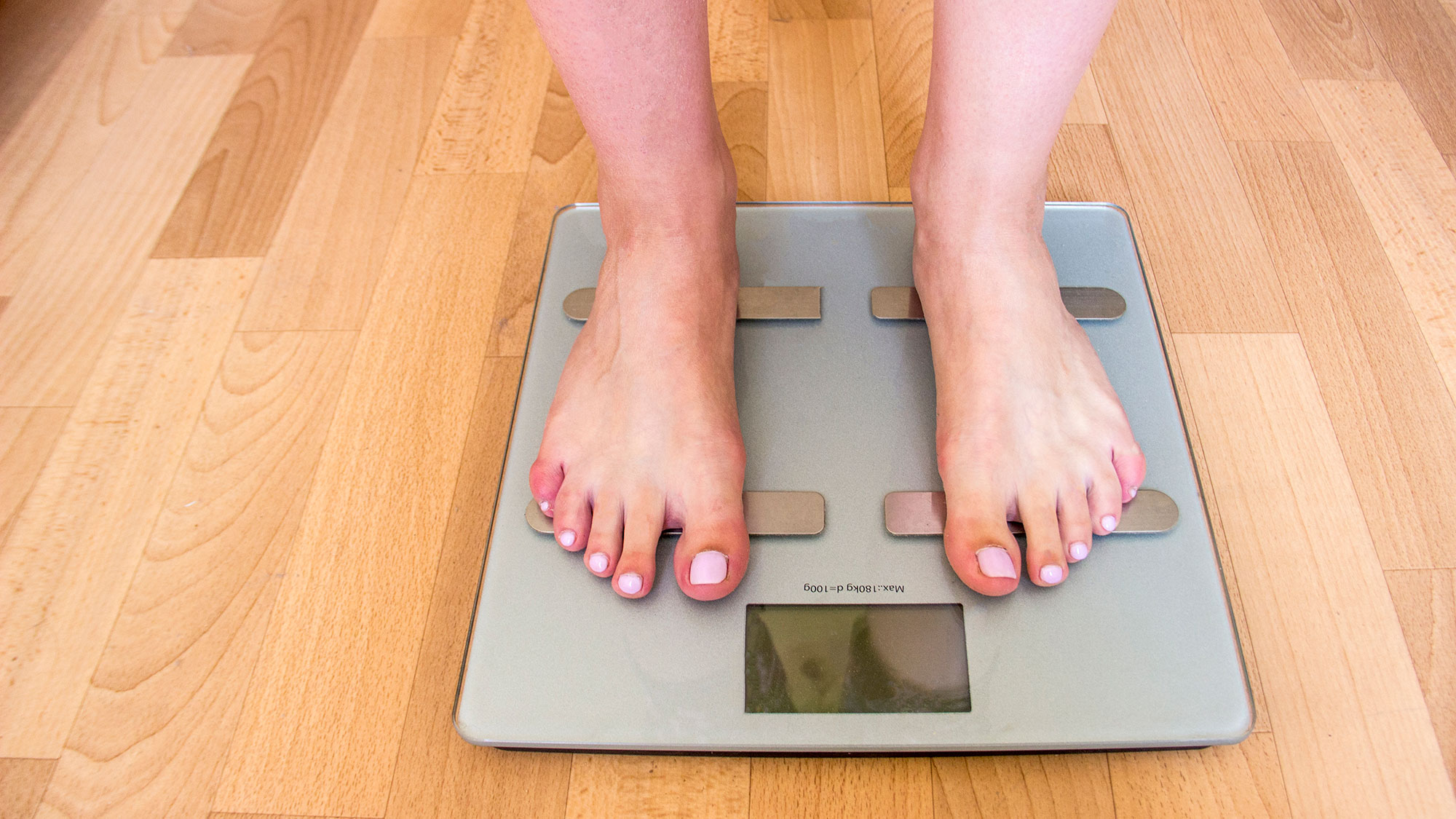'Six things I found when I weighed myself every day for a month'
See what our writer discovered when she took to the scales every day for 30 days…


Some experts say that for weight loss, weighing yourself every day is a good idea. In fact, one study that took place over a 12 month period found that those who weighed themselves everyday were more successful at losing weight, as well as maintaining step goals and adhering to energy intake.
However, whilst it may lead to long term changes, I found that weighing myself every day was a minefield, and made me a little ‘obsessive’.
For one month, I took my best bathroom scales (I use Tanita's BC-401 connected scales) out of my cupboard every morning and cautiously stepped on. I’m 5ft 7in and I weigh around 58kg, but I went up to near 60kg at one point and dropped down to 56kg at another.
But why? This is what I found after weighing myself every day for one month...
I ballooned around my period
In the middle of my month-on-the-scales, I came on my period. A bog standard female occurrence. Yet, the week before my period, it was as though someone has shoved some sandbags down my jeans; I weighed 1.5 kilos more! That’s a considerable amount.
Dr Jodie Moss is an Exercise Physiologist working with Healthspan. She explains that period-related weight gain is a symptom of premenstrual syndrome, AKA that fantastic thing we know as PMS.
‘This period related weight gain may be the result of water retention, caused by eating foods that are higher in carbohydrates as you’re craving sugary/fatty/salty foods,' she told me.
Start your week with achievable workout ideas, health tips and wellbeing advice in your inbox.
She added that around this time you may also be feeling more lethargic due to the hormone fluctuations so you may be limiting the amount you normally move around.
Dr Moss explains before a period, you get an increase in the hormone progesterone. This then leads to an increase in the hormone aldosterone, which then leads to sodium and water retention which can lead to an increase in weight on the scales.
‘Progesterone also increases breast tenderness – with some women experiencing their breasts increasing by a full cup size. This is due to fluid being stored making them bigger.’
After menstruation, my weight dropped
It was like a weight off my shoulders, or should I say weight off my tummy. But why?
‘This may be due to feelings of cravings dissipating, which causes you to choose different types of foods that don’t increase water retention,’ reveals Dr Moss.
‘Normally the foods chosen in the lead up to a period are high carbohydrate foods that are salty and this causes the body to retain water. Once you have started your period, levels of the hormone oestrogen drops, providing some relief.
A post shared by - Lucy E Gornall - (@lucyelizabethgornall)
A photo posted by on
Bowel movements make a big difference
It doesn’t take a scientist to work out that if something leaves your body, it will likely impact scale weight too.
On days where I was perhaps a little more constipated for whatever reason, my weight was higher. This was also the case when I was suffering from a bout of trapped wind.
‘Unfortunately, gas doesn’t weigh anything so it wouldn’t be in response to trapped wind per se,' Dr Moss told me.
'It is likely due to being constipated and therefore not going to the toilet for your normal bowel movement.'
She puts this down to 'a by-product of either fermentation of food in your gut or food not being broken down properly, which means you are producing gas and you can have a lot of bloating in response to this around your stomach area.'
If you're suffering from gas, simple movements can help such as this wind-relieving yoga pose.
My mood was dictated by the scale number
There’s a reason why fitness guru Joe Wicks dubbed bathroom scales ‘the sad step’. In fact, I found that weighing myself every day led to every mood under the sun. From sad to happy to disappointed to excited; that little number can make or break your day.
One morning - albeit after a large dinner the night before- the scales were noticeably higher than usual. Despite waking up calm and content, I instantly flipped and became quite angry at myself. How could I have eaten so much that I put on weight?
The next morning however my weight was back to my average, and I serenely packed my scales away and carried on with my day, content in the knowledge that my weight was a-ok.
It’s safe to say that it was all a little mentally exhausting.
The morning after the night before, I weighed the least
There were several mornings where the previous night I’d drunk one too many.
But, with alcohol packing in a fair few calories (a 250 ml glass of red wine can contain over 200 calories - and who stops at one glass!?), I assumed the scales would rise, sharply - but they didn’t. Why?
‘This is likely in response to alcohol being a diuretic – meaning that you will excrete more fluid,' Dr Moss explains.
The British Nutrition Foundation say that the average person produces 350 ml of urine for every large (250 ml) glass of wine drunk, resulting in a net loss of 100 ml per glass.
'Therefore, while you appear to weigh less, it’s likely in response to being dehydrated rather than alcohol has caused you to lose adipose tissue (fat).'
Of course, being dehydrated is not a good thing. A good rule of thumb when drinking alcohol is to ensure you drink a non-alcoholic drink between every alcoholic drink.
Dr Moss adds that despite short term ‘weight loss’, in the long term an excess of alcohol calories could actually lead to weight gain.
‘When you drink alcohol, your body metabolises this first rather than breaking down the food you have consumed before or during the intake of alcohol. This response inhibits your ability to burn calories from the food you have just eaten as it is burning the using the calories from alcohol first. This can lead to weight gain as you are consuming excess calories.’
Overall my weight didn't change
I’m a pretty active gal (as a personal trainer it's literally part of my job), and I eat a generally healthy, balanced diet. But like all of us, I enjoy pizza on the weekend (with pineapple FYI) and some wine. OK, lots of wine.
During the course of this month I found myself ‘treating’ myself more than usual, thanks to birthdays and just generally feeling less motivated due to the UK’s coronavirus lockdown.
However, outside of the fluctuations I've already described, my weight stayed exactly the same.
So, if you’re someone who thinks that enjoying ‘guilty’ food will lead to weight gain, don’t worry. As I like to say: ‘A cheat meal won’t make you fat, and a salad won’t make you skinny’.
Although weighing myself every day was eye-opening, it's certainly not something I would continue with. The constant feeling of dread I felt every morning as I stepped onto the scales was really degrading and my day was dictated by my weight. Not cool.
In saying that, I can see how weighing yourself every day would perhaps provide motivation to lose weight - if that is your goal. Seeing the number creep up over time could persuade you to perhaps move a little more or cut out certain sugary snacks.
Lucy is a freelance journalist specializing in health, fitness and lifestyle. She was previously the Health and Fitness Editor across various women's magazines, including Woman&Home, Woman and Woman’s Own as well as Editor of Feel Good You. She has also previously written for titles including Now, Look, Cosmopolitan, GQ, Red and The Sun.
She lives and breathes all things fitness; working out every morning with a mix of running, weights, boxing and long walks. Lucy is a Level 3 personal trainer and teaches classes at various London studios. Plus, she's pre- and post-natal trained and helps new mums get back into fitness after the birth of their baby. Lucy claims that good sleep, plenty of food and a healthy gut (seriously, it's an obsession) are the key to maintaining energy and exercising efficiently. Saying this, she's partial to many classes of champagne and tequila on the rocks whilst out with her friends.
